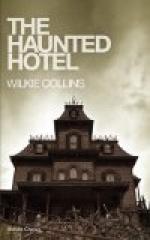’She suddenly pauses—considers for a while—and springs to her feet, with a cry of triumphant surprise: the wonderful, the unparalleled idea has crossed her mind like a flash of lightning. Make the two men change names and places—and the deed is done! Where are the obstacles? Remove my Lord (by fair means or foul) from his room; and keep him secretly prisoner in the palace, to live or die as future necessity may determine. Place the Courier in the vacant bed, and call in the doctor to see him—ill, in my Lord’s character, and (if he dies) dying under my Lord’s name!’
The manuscript dropped from Henry’s hands. A sickening sense of horror overpowered him. The question which had occurred to his mind at the close of the First Act of the Play assumed a new and terrible interest now. As far as the scene of the Countess’s soliloquy, the incidents of the Second Act had reflected the events of his late brother’s life as faithfully as the incidents of the First Act. Was the monstrous plot, revealed in the lines which he had just read, the offspring of the Countess’s morbid imagination? or had she, in this case also, deluded herself with the idea that she was inventing when she was really writing under the influence of her own guilty remembrances of the past? If the latter interpretation were the true one, he had just read the narrative of the contemplated murder of his brother, planned in cold blood by a woman who was at that moment inhabiting the same house with him. While, to make the fatality complete, Agnes herself had innocently provided the conspirators with the one man who was fitted to be the passive agent of their crime.
Even the bare doubt that it might be so was more than he could endure. He left his room; resolved to force the truth out of the Countess, or to denounce her before the authorities as a murderess at large.
Arrived at her door, he was met by a person just leaving the room. The person was the manager. He was hardly recognisable; he looked and spoke like a man in a state of desperation.
‘Oh, go in, if you like!’ he said to Henry. ’Mark this, sir! I am not a superstitious man; but I do begin to believe that crimes carry their own curse with them. This hotel is under a curse. What happens in the morning? We discover a crime committed in the old days of the palace. The night comes, and brings another dreadful event with it—a death; a sudden and shocking death, in the house. Go in, and see for yourself! I shall resign my situation, Mr. Westwick: I can’t contend with the fatalities that pursue me here!’
Henry entered the room.
The Countess was stretched on her bed. The doctor on one side, and the chambermaid on the other, were standing looking at her. From time to time, she drew a heavy stertorous breath, like a person oppressed in sleeping. ‘Is she likely to die?’ Henry asked.
‘She is dead,’ the doctor answered. ’Dead of the rupture of a blood-vessel on the brain. Those sounds that you hear are purely mechanical— they may go on for hours.’




